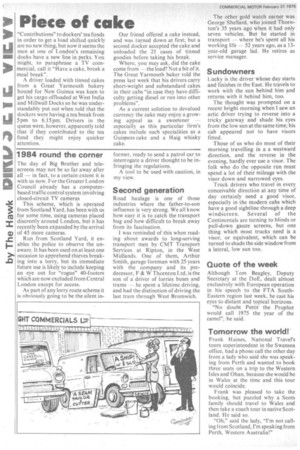Piece of cake
Page 54

If you've noticed an error in this article please click here to report it so we can fix it.
"Contributions" to dockers' tea funds in order to get a load shifted quickly are no new thing, but now it seems the men at one of London's remaining docks have a new line in perks. You might, to paraphrase a TV commercial, call it "Have a cake, break a meal break".
A driver loaded with tinned cakes from a Great Yarmouth bakery bound for New Guinea was keen to get his cargo offloaded at West India and Millwall Docks so he was understandably put out when told that the dockers were having a tea break from 5 pm to 6.15 pm. Drivers in the queue were, however, apparently told that if they contributed to the tea fund they might enjoy quicker attention. Our friend offered a cake instead, and was turned down at first; but a second docker accepted the cake and unloaded the 21 cases of tinned goodies before taking his break.
Where, you may ask, did the cake come from — the load? Not a bit of it. The Great Yarmouth baker told the press last week that his drivers carry short-weight and substandard cakes in their cabs "in case they have difficulty getting diesel or run into other problems".
As a current solution to devalued currency the cake may enjoy a grow ing appeal as a sweetener especially as this particular firm's cakes include such specialities as a Guinness cake and a Haig whisky cake. The other gold watch earner was George Shellard, who joined Thornton's 35 years ago when it had only seven vehicles. But he started in transport — where he's spent all his working life — 52 years ago, as a 13year-old garage lad. He retires as service manager.
S undowners
Lucky is the driver whose day starts and finishes in the East He travels to work with the sun behind him and returns with it behind him, too.
The thought was prompted on a recent bright morning when I saw an artic driver trying to reverse into a tricky gateway and shade his eyes from the low sun at the same time; his cab appeared not to have visors fitted.
Those of us who do most of their morning travelling in a a westward direction, and the reverse in the evening, hardly ever use a visor. The folk who do the opposite run must spend a lot of their mileage with the visor down and narrowed eyes.
Truck drivers who travel in every conceivable direction at any time of day certainly need a good visor, especially in the modern cabs which have a good sightline through a deep winckcreen. Several of the Continentals are turning to blinds or pull-down gauze screens, but one thing which most trucks need is a visor, or equivalent, which can be turned to shade the side window from a lateral, low sun too.
Quote of the week
Although Tom Beagley, Deputy Secretary at the DoE, dealt almost exclusively with European operation in his speech to the FTA SouthEastern region last week, he cast his eyes to distant and topical horizons.
"No doubt Pettit the Prophet would call 1975 the year of the camel", he said.
Tomorrow the world!'
Frank Haines, National Travel's tours superintendent in the Swansea office, had a phone call the other day from a lady who said she was speaking from Perth and wanted to book three seats on a trip to the Western Isles and Oban, because she would be in Wales at the time and this tour would coincide.
Frank was pleased to take the booking, but puzzled why a Scots family should travel to Wales and then take a coach tour in native Scotland. He said so.
"Oh," said the lady, "l'm not calling from Scotland, I'm speaking from Perth, Western Australia!"












































































































